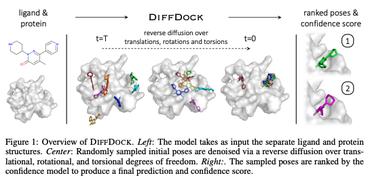Search Results for author: Mohammad M. Sultan
Found 7 papers, 3 papers with code
Compositional Deep Probabilistic Models of DNA Encoded Libraries
no code implementations • 20 Oct 2023 • Benson Chen, Mohammad M. Sultan, Theofanis Karaletsos
DNA-Encoded Library (DEL) has proven to be a powerful tool that utilizes combinatorially constructed small molecules to facilitate highly-efficient screening assays.
DEL-Dock: Molecular Docking-Enabled Modeling of DNA-Encoded Libraries
1 code implementation • 30 Nov 2022 • Kirill Shmilovich, Benson Chen, Theofanis Karaletsos, Mohammad M. Sultan
Computational models have been deployed to learn the latent binding affinities that are correlated to the sequenced count data; however, this correlation is often obfuscated by various sources of noise introduced in its complicated data-generation process.
Using Deep Learning for Segmentation and Counting within Microscopy Data
1 code implementation • 28 Feb 2018 • Carlos X. Hernández, Mohammad M. Sultan, Vijay S. Pande
Cell counting is a ubiquitous, yet tedious task that would greatly benefit from automation.
Automated design of collective variables using supervised machine learning
no code implementations • 28 Feb 2018 • Mohammad M. Sultan, Vijay S. Pande
In particular, we show how the decision functions in supervised machine learning (SML) algorithms can be used as initial CVs (SML_cv) for accelerated sampling.
Transferable neural networks for enhanced sampling of protein dynamics
no code implementations • 2 Jan 2018 • Mohammad M. Sultan, Hannah K. Wayment-Steele, Vijay S. Pande
In this work, we illustrate how this non-linear latent embedding can be used as a collective variable for enhanced sampling, and present a simple modification that allows us to rapidly perform sampling in multiple related systems.
Variational Encoding of Complex Dynamics
2 code implementations • 23 Nov 2017 • Carlos X. Hernández, Hannah K. Wayment-Steele, Mohammad M. Sultan, Brooke E. Husic, Vijay S. Pande
Recent work in the field of deep learning has led to the development of variational autoencoders (VAE), which are able to compress complex datasets into simpler manifolds.
Understanding Protein Dynamics with L1-Regularized Reversible Hidden Markov Models
no code implementations • 6 May 2014 • Robert T. McGibbon, Bharath Ramsundar, Mohammad M. Sultan, Gert Kiss, Vijay S. Pande
We present an EM algorithm for learning and introduce a model selection criteria based on the physical notion of convergence in relaxation timescales.


